Fleurs du Mal Magazine


Or see the index
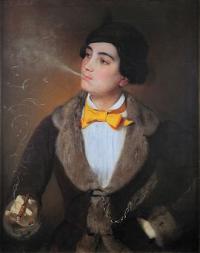
Die wilde Rose
Da droben auf einsamer Höhe
Die wilde Rose blüht,
Und wer sie von Ferne gesehen,
In heißer Sehnsucht erglüht.
Zu ihr über Felsen und Klüfte
Ein kühner Jäger klimmt.
Schon ist er in nächster Nähe –
Das Auge in Thränen ihm schwimmt.
Er will sie erfassen und pflücken.
Da strauchelt jäh sein Fuß;
Des Abgrunds finstere Tiefe
Empfängt ihn mit kaltem Kuß.
Da droben auf einsamer Höhe
Die wilde Rose blüht,
Und wer sie von Ferne gesehen.
In heißer Sehnsucht erglüht. –
Louise Aston
(1814-1871)
Die wilde Rose
• fleursdumal.nl magazine
More in: # Classic Poetry Archive, Archive A-B, Archive A-B, Feminism

Plainte sur la mort de Sylvie
Ruisseau qui cours après toi-même
Et qui te fuis toi-même aussi,
Arrête un peu ton onde ici
Pour écouter mon deuil extrême.
Puis, quand tu l’auras su, va-t’en dire à la mer
Qu’elle n’a rien de plus amer.
Raconte-lui comme Sylvie,
Qui seule gouverne mon sort,
A reçu le coup de la mort
Au plus bel âge de la vie,
Et que cet accident triomphe en même jour
De toutes les forces d’Amour.
Las ! je n’en puis dire autre chose,
Mes soupirs tranchent mon discours.
Adieu, ruisseau, reprends ton cours
Qui, non plus que moi, se repose ;
Que si, par mes regrets, j’ai bien pu t’arrêter,
Voici des pleurs pour te hâter.
Marc-Antoine Girard de Saint-Amant
(1594 – 1661)
Plainte sur la mort de Sylvie
• fleursdumal.nl magazine
More in: # Classic Poetry Archive, Archive G-H, Archive S-T, Archive S-T
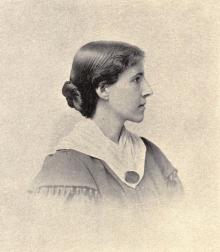
Boys will be boys
“Boys will be boys,” and boys have had their day;
Boy-mischief and boy-carelessness and noise
Extenuated all, allowed, excused and smoothed away,
Each duty missed, each damaging wild act,
By this meek statement of unquestioned fact–
Boys will be boys!
Now, “women will be women.” Mark the change;
Calm motherhood in place of boisterous youth;
No warfare now; to manage and arrange,
To nurture with wise care, is woman’s way,
In peace and fruitful industry her sway,
In love and truth.
Charlotte Perkins Gilman
(1860-1935)
Boys will be boys
Suffrage Songs and Verses
• fleursdumal.nl magazine
More in: # Classic Poetry Archive, Archive G-H, Archive G-H, Feminism

La débauche
(extrait)
Bacchus ! qui vois notre débauche,
Par ton saint portrait que j’ébauche
En m’enluminant le museau
De ce trait que je bois sans eau ;
Par ta couronne de lierre,
Par la splendeur de ce grand verre,
Par ton thyrse tant redouté,
Par ton éternelle santé,
Par l’honneur de tes belles fêtes,
Par tes innombrables conquêtes,
Par les coups non donnés, mais bus,
Par tes glorieux attributs,
Par les hurlements des Ménades,
Par le haut goût des carbonnades,
Par tes couleurs blanc et clairet,
Par le plus fameux cabaret,
Par le doux chant de tes orgies,
Par l’éclat des trognes rougies,
Par table ouverte à tout venant,
Par les fins mors de ta cabale,
Par le tambour et la cymbale,
Par tes cloches qui sont des pots,
Par tes soupirs qui sont des rots,
Par tes hauts et sacrés mystères,
Par tes furieuses panthères,
Par ce lieu si frais et si doux,
Par ton bouc, paillard comme nous,
Par ta grosse garce Ariane,
Par le vieillard monté sur l’âne,
Par les satyres, tes cousins,
Par la fleur des plus beaux raisins,
Par ces bisques si renommées,
Par ces langues de boeuf fumées,
Par ce tabac, ton seul encens,
Par tous les plaisirs innocents,
Par ce jambon couvert d’épice,
Par ce long pendant de saucisse,
Par la majesté de ce broc,
Par masse, tope, cric et croc,
Par cette olive que je mange,
Par ce gai passeport d’orange,
Par ce vieux fromage pourri,
Bref par Gillot, ton favori,
Reçois-nous dans l’heureuse troupe,
Des francs chevaliers de la coupe,
Et, pour te montrer tout divin,
Ne la laisse jamais sans vin.
Marc-Antoine Girard de Saint-Amant
(1594 – 1661)
La débauche
(extrait)
• fleursdumal.nl magazine
More in: # Classic Poetry Archive, Archive G-H, Archive S-T, Archive S-T

“We as women”
There’s a cry in the air about us–
We hear it before, behind–
Of the way in which “We, as women,”
Are going to lift mankind!
With our white frocks starched and ruffled,
And our soft hair brushed and curled–
Hats off! for “We, as women,”
Are coming to save the world.
Fair sisters, listen one moment–
And perhaps you’ll pause for ten:
The business of women as women
Is only with men as men!
What we do, “We, as women,”
We have done all through our life;
The work that is ours as women
Is the work of mother and wife.
But to elevate public opinion,
And to lift up erring man,
Is the work of the Human Being;
Let us do it–if we can.
But wait, warm-hearted sisters–
Not quite so fast, so far.
Tell me how we are going to lift a thing
Any higher than we are!
We are going to “purify politics,”
And to “elevate the press.”
We enter the foul paths of the world
To sweeten and cleanse and bless.
To hear the high things we are going to do,
And the horrors of man we tell,
One would think, “We, as women,” were angels,
And our brothers were fiends of hell.
We, that were born of one mother,
And reared in the self-same place,
In the school and the church together,
We of one blood, one race!
Now then, all forward together!
But remember, every one,
That ’tis not by feminine innocence
The work of the world is done.
The world needs strength and courage,
And wisdom to help and feed–
When, “We, as women” bring these to man,
We shall lift the world indeed.
Charlotte Perkins Gilman
(1860-1935)
“We as women”
Suffrage Songs and Verses
• fleursdumal.nl magazine
More in: # Classic Poetry Archive, Archive G-H, Archive G-H, Feminism
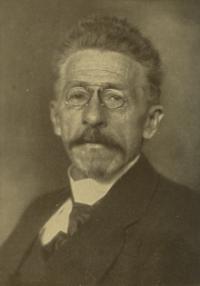
“Hab’ Sonne im Herzen”
Hab’ Sonne im Herzen, obs stürmt oder schneit
Ob der Himmel voll Wolken, die Erd voller Streit.
Hab’ Sonne im Herzen, dann komme was mag,
das leuchtet voll Licht dir den dunkelsten Tag.
Hab’ ein Lied auf den Lippen mit fröhlichem Klang
und macht auch des Alltags Gedränge dich bang!
Hab’ ein Lied auf den Lippen, dann komme was mag,
das hilft dir verwinden den einsamsten Tag!
Hab’ ein Wort auch für andre in Sorg’ und in Pein,
und sag, was dich selber so frohgemut lässt sein:
Hab’ ein Lied auf den Lippen, verlier nie den Mut,
hab’ Sonne im Herzen, und alles wird gut.
Cäsar Flaischlen
(1864-1920)
“Hab’ Sonne im Herzen”
• fleursdumal.nl magazine
More in: # Classic Poetry Archive, Archive E-F, Archive E-F
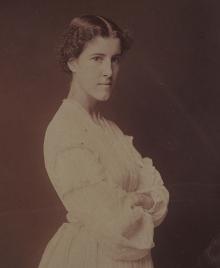
Females
The female fox she is a fox;
The female whale a whale;
The female eagle holds her place
As representative of race
As truly as the male.
The mother hen doth scratch for her chicks,
And scratch for herself beside;
The mother cow doth nurse her calf,
Yet fares as well as her other half
In the pasture free and wide.
The female bird doth soar in air;
The female fish doth swim;
The fleet-foot mare upon the course
Doth hold her own with the flying horse–
Yea and she beateth him!
One female in the world we find
Telling a different tale.
It is the female of our race,
Who holds a parasitic place
Dependent on the male.
Not so, saith she, ye slander me!
No parasite am I.
I earn my living as a wife;
My children take my very life;
Why should I share in human strife,
To plant and build and buy?
The human race holds highest place
In all the world so wide,
Yet these inferior females wive,
And raise their little ones alive,
And feed themselves beside.
The race is higher than the sex,
Though sex be fair and good;
A Human Creature is your state,
And to be human is more great
Than even womanhood!
The female fox she is a fox;
The female whale a whale;
The female eagle holds her place
As representative of race
As truly as the male.
Charlotte Perkins Gilman
(1860-1935)
Females
Suffrage Songs and Verses
• fleursdumal.nl magazine
More in: # Classic Poetry Archive, Archive G-H, Archive G-H, Feminism

Canticle Of The Babe
I
Over the broken world, the dark gone by,
Horror of outcast darkness torn with wars;
And timeless agony
Of the white fire, heaped high by blinded Stars,
Unfaltering, unaghast;–
Out of the midmost Fire
At last,–at last,–
Cry! …
O darkness’ one desire,–
O darkness, have you heard?–
Black Chaos, blindly striving towards the Word?
–The Cry!
Behold thy conqueror, Death!
Behold, behold from whom
It flutters forth, that triumph of First-Breath,
Victorious one that can but breathe and cling,–
This pulsing flower,–this weaker than a wing,
Halcyon thing!–
Cradled above unfathomable doom.
II
Under my feet, O Death,
Under my trembling feet!
Back, through the gates of hell, now give me way.
I come.–I bring new Breath!
Over the trampled shards of mine own clay,
That smoulder still, and burn,
Lo, I return!
Hail, singing Light that floats
Pulsing with chorused motes:–
Hail to thee, Sun, that lookest on all lands!
And take thou from my weak undying hands,
A precious thing, unblemished, undefiled:–
Here, on my heart uplift,
Behold the Gift,–
Thy glory and my glory, and my child!
III
(And our eyes were opened; eyes that had been holden.
And I saw the world, and the fruits thereof.
And I saw their glories, scarlet-stained and golden,
All a crumbled dust beneath the feet of Love.
And I saw their dreams, all of nothing worth;
But a path for Love, for Him to walk above,
And I saw new heaven, and new earth.)
IV
The grass is full of murmurs;
The sky is full of wings;
The earth is full of breath.
With voices, choir on choir
With tongues of fire,
They sing how Life out-sings–
Out-numbers Death.
V
Who are these that fly;
As doves, and as doves to the windows?
Doves, like hovering dreams round Love that slumbereth;
Silvering clouds blown by,
Doves and doves to the windows,–
Warm through the radiant sky their wings beat breath.
They are the world’s new-born:
Doves, doves to the windows!
Lighting, as flakes of snow;
Lighting, as flakes of flame;
Some to the fair sown furrows;
Some to the huts and burrows
Choked of the mire and thorn,–
Deep in the city’s shame.
Wind-scattered wreaths they go,
Doves, and doves, to the windows;
Some for worshipping arms, to shelter and fold, and shrine;
Some to be torn and trodden,
Withered and waste, and sodden;
Pitiful, sacred leaves from Life’s dishonored vine.
VI
O Vine of Life, that in these reaching fingers,
Urges a sunward way!
Hold here and climb, and halt not, that there lingers
So far outstripped, my halting, wistful clay.
Make here thy foothold of my rapturous heart,–
Yea, though the tendrils start
To hold and twine!
I am the heart that nursed
Thy sunward thirst.–
A little while, a little while, O Vine,
My own and never mine,
Feed thy sweet roots with me
Abundantly.
O wonder-wildness of the pushing Bud
With hunger at the flood,
Climb on, and seek, and spurn.
Let my dull spirit learn
To follow with its longing, as it may,
While thou seek higher day.–
But thou, the reach of my own heart’s desire,
Be free as fire!
Still climb and cling; and so
Outstrip,–outgrow.
O Vine of Life, my own and not my own,
So far am I outgrown!
High as I may, I lift thee, Soul’s Desire.
–Lift thou me higher.
And thou, Wayfaring Woman, whom I meet
On all the highways,–every brimming street,
Lady Demeter, is it thou, grown gaunt
With work and want?
At last, and with what shamed and stricken eyes,
I see through thy disguise
Of drudge and Exile,–even the holy boon
That silvers yonder in the Harvest-moon;–
That dimly under glows
The furrows of thy worn immortal face,
With mother-grace.
O Queen and Burden-bearer, what of those
To whom thou gavest the lily and the rose
Of thy far youth?… For whom,
Out of the wondrous loom
Of thine enduring body, thou didst make
Garments of beauty, cunningly adorned,
But only for Death’s sake!
Largess of life, but to lie waste and scorned.–
Could not such cost of pain,
Nor daily utmost of thy toil prevail?–
But they must fade, and pale,
And wither from thy desolated throne?–
And still no Summer give thee back again
Thine own?
Lady of Sorrows,–Mother,–Drudge august.
Behold me in the dust.
Josephine Preston Peabody
(1874 – 1922)
Canticle Of The Babe
• fleursdumal.nl magazine
More in: # Classic Poetry Archive, Archive O-P, Archive O-P

Kumulipo
(Hawaiian creation chant)
At the time that turned the heat of the earth,
At the time when the heavens turned and changed,
At the time when the light of the sun was subdued
To cause light to break forth,
At the time of the night of Makalii (winter)
Then began the slime which established the earth,
The source of deepest darkness.
Of the depth of darkness, of the depth of darkness,
Of the darkness of the sun, in the depth of night,
It is night,
So was night born
Kumulipo
O ke au i kahuli wela ka honua
O ke au i kahuli lole ka lani
O ke au i kukaiaka ka la.
E hoomalamalama i ka malama
O ke au o Makali’i ka po
O ka walewale hookumu honua ia
O ke kumu o ka lipo, i lipo ai
O ke kumu o ka Po, i po ai
O ka lipolipo, o ka lipolipo
O ka lipo o ka la, o ka lipo o ka po
Po wale hoi
Hanau ka po
Queen Liliʻuokalani
(1838-1917)
Kumulipo
Hawaiian creation chant
• fleursdumal.nl magazine
Queen Liliʻuokalani was born on September 2, 1838 in Honolulu, Hawaii, as Lydia Kamakaeha. She was proclaimed queen in 1891. The last monarch of Hawaii, her reign was short-lived due to a U. S. military-backed coup in 1893.
More in: # Classic Poetry Archive, Archive K-L, Archive K-L

The Singing Man
I
He sang above the vineyards of the world.
And after him the vines with woven hands
Clambered and clung, and everywhere unfurled
Triumphing green above the barren lands;
Till high as gardens grow, he climbed, he stood,
Sun-crowned with life and strength, and singing toil,
And looked upon his work; and it was good:
The corn, the wine, the oil.
He sang above the noon. The topmost cleft
That grudged him footing on the mountain scars
He planted and despaired not; till he left
His vines soft breathing to the host of stars.
He wrought, he tilled; and even as he sang,
The creatures of his planting laughed to scorn
The ancient threat of deserts where there sprang
The wine, the oil, the corn!
He sang not for abundance.–Over-lords
Took of his tilth. Yet was there still to reap,
The portion of his labor; dear rewards
Of sunlit day, and bread, and human sleep.
He sang for strength; for glory of the light.
He dreamed above the furrows, ‘They are mine!’
When all he wrought stood fair before his sight
With corn, and oil, and wine.
Truly, the light is sweet
Yea, and a pleasant thing
It is to see the Sun.
And that a man should eat
His bread that he hath won;–
(So is it sung and said),
That he should take and keep,
After his laboring,
The portion of his labor in his bread,
His bread that he hath won;
Yea, and in quiet sleep,
When all is done.
He sang; above the burden and the heat,
Above all seasons with their fitful grace;
Above the chance and change that led his feet
To this last ambush of the Market-place.
‘Enough for him,’ they said–and still they say–
‘A crust, with air to breathe, and sun to shine;
He asks no more!’–Before they took away
The corn, the oil, the wine.
He sang. No more he sings now, anywhere.
Light was enough, before he was undone.
They knew it well, who took away the air,
–Who took away the sun;
Who took, to serve their soul-devouring greed,
Himself, his breath, his bread–the goad of toil;–
Who have and hold, before the eyes of Need,
The corn, the wine,–the oil!
Truly, one thing is sweet
Of things beneath the Sun;
This, that a man should earn his bread and eat,
Rejoicing in his work which he hath done.
What shall be sung or said
Of desolate deceit.
When others take his bread;
His and his children’s bread?–
And the laborer hath none.
This, for his portion now, of all that he hath done.
He earns; and others eat.
He starves;–they sit at meat
Who have taken away the Sun.
II
Seek him now, that singing Man.
Look for him,
Look for him
In the mills,
In the mines;
Where the very daylight pines,–
He, who once did walk the hills!
You shall find him, if you scan
Shapes all unbefitting Man,
Bodies warped, and faces dim.
In the mines; in the mills
Where the ceaseless thunder fills
Spaces of the human brain
Till all thought is turned to pain.
Where the skirl of wheel on wheel,
Grinding him who is their tool,
Makes the shattered senses reel
To the numbness of the fool.
Perisht thought, and halting tongue
(Once it spoke;–once it sung!)
Live to hunger, dead to song.
Only heart-beats loud with wrong
Hammer on, – – How long?
. . How long? – – How long?
Search for him;
Where the crazy atoms swim
Up the fiery furnace-blast.
You shall find him, at the last,–
He whose forehead braved the sun,–
Wreckt and tortured and undone.
Where no breath across the heat
Whispers him that life was sweet;
But the sparkles mock and flare,
Scattering up the crooked air.
(Blackened with that bitter mirk,–
Would God know His handiwork?)
Thought is not for such as he;
Naught but strength, and misery;
Since, for just the bite and sup,
Life must needs be swallowed up.
Only, reeling up the sky,
Hurtling flames that hurry by,
Gasp and flare, with Why–Why,
. . . Why? . . .
Why the human mind of him
Shrinks, and falters and is dim
When he tries to make it out:
What the torture is about.–
Why he breathes, a fugitive
Whom the World forbids to live.
Why he earned for his abode,
Habitation of the toad!
Why his fevered day by day
Will not serve to drive away
Horror that must always haunt:–
. . . Want . . . Want!
Nightmare shot with waking pangs;–
Tightening coil, and certain fangs,
Close and closer, always nigh …
. . . Why? . . . Why?
Why he labors under ban
That denies him for a man.
Why his utmost drop of blood
Buys for him no human good;
Why his utmost urge of strength
Only lets Them starve at length;–
Will not let him starve alone;
He must watch, and see his own
Fade and fail, and starve, and die.
* * * *
. . . Why? . . . Why?
* * * *
Heart-beats, in a hammering song,
Heavy as an ox may plod,
Goaded–goaded–faint with wrong,
Cry unto some ghost of God
. . . How long? . . . How long?
. . . . . . How long?
III
Seek him yet. Search for him!
You shall find him, spent and grim;
In the prisons, where we pen
These unsightly shards of men.
Sheltered fast;
Housed at length;
Clothed and fed, no matter how!–
Where the householders, aghast,
Measure in his broken strength
Nought but power for evil, now.
Beast-of-burden drudgeries
Could not earn him what was his:
He who heard the world applaud
Glories seized by force and fraud,
He must break,–he must take!–
Both for hate and hunger’s sake.
He must seize by fraud and force;
He must strike, without remorse!
Seize he might; but never keep.
Strike, his once!–Behold him here.
(Human life we buy so cheap,
Who should know we held it dear?)
No denial,–no defence
From a brain bereft of sense,
Any more than penitence.
But the heart-beats now, that plod
Goaded–goaded–dumb with wrong,
Ask not even a ghost of God
. . . . . . How long?
When the Sea gives up its dead,
Prison caverns, yield instead
This, rejected and despised;
This, the Soiled and Sacrificed!
Without form or comeliness;
Shamed for us that did transgress;
Bruised, for our iniquities,
With the stripes that are all his!
Face that wreckage, you who can.
It was once the Singing Man.
IV
Must it be?–Must we then
Render back to God again
This His broken work, this thing,
For His man that once did sing?
Will not all our wonders do?
Gifts we stored the ages through,
(Trusting that He had forgot)–
Gifts the Lord requir’d not?
Would the all-but-human serve!
Monsters made of stone and nerve;
Towers to threaten and defy
Curse or blessing of the sky;
Shafts that blot the stars with smoke;
Lightnings harnessed under yoke;
Sea-things, air-things, wrought with steel,
That may smite, and fly, and feel!
Oceans calling each to each;
Hostile hearts, with kindred speech.
Every work that Titans can;
Every marvel: save a man,
Who might rule without a sword.–
Is a man more precious, Lord?
Can it be?–Must we then
Render back to Thee again
Million, million wasted men?
Men, of flickering human breath,
Only made for life and death?
Ah, but see the sovereign Few,
Highly favored, that remain!
These, the glorious residue,
Of the cherished race of Cain.
These, the magnates of the age,
High above the human wage,
Who have numbered and possesst
All the portion of the rest!
What are all despairs and shames,
What the mean, forgotten names
Of the thousand more or less,
For one surfeit of success?
For those dullest lives we spent,
Take these Few magnificent!
For that host of blotted ones,
Take these glittering central suns.
Few;–but how their lustre thrives
On the million broken lives!
Splendid, over dark and doubt,
For a million souls gone out!
These, the holders of our hoard,–
Wilt thou not accept them, Lord?
V
Oh, in the wakening thunders of the heart,
– – The small lost Eden, troubled through the night,
Sounds there not now,–forboded and apart,
Some voice and sword of light?
Some voice and portent of a dawn to break?–
Searching like God, the ruinous human shard
Of that lost Brother-man Himself did make,
And Man himself hath marred?
It sounds!–And may the anguish of that birth
Seize on the world; and may all shelters fail,
Till we behold new Heaven and new Earth
Through the rent Temple-vail!
When the high-tides that threaten near and far
To sweep away our guilt before the sky,–
Flooding the waste of this dishonored Star,
Cleanse, and o’erwhelm, and cry!–
Cry, from the deep of world-accusing waves,
With longing more than all since Light began,
Above the nations,–underneath the graves,–
‘Give back the Singing Man!’
Josephine Preston Peabody
(1874 – 1922)
The Singing Man
• fleursdumal.nl magazine
More in: # Classic Poetry Archive, Archive O-P, Archive O-P

Gladness
Unto my Gladness then I cried:
‘I will not be denied!
Answer me now; and tell me why
Thou dost not fall, as a broken star
Out of the Dark where such things are,
And where such bright things die.
How canst thou, with thy fountain dance
Shatter clear sight with radiance?–
How canst thou reach and soar, and fling,
Over my heart’s dark shuddering,
Unearthly lights on everything?
What dost thou see? What dost thou know?’
My Gladness said to me, bowed below,
‘Gladness I am: created so.’
‘And dare’st thou, in my mortal veins
Sing, with the Spring’s descending rains?
While in this hour, and momently,
Forth of myself I look, and see
Torn treasure of my heart’s Desire;
And human glories in the mire,
That should make glad some paradise!–
The childhood strewn in foulest place,
The girlhood, plundered of its grace;
The eyelids shut upon spent eyes
That never looked upon thy face!
Answer me, thou, if answer be!’
My Gladness said to me:
‘Weep if thou wilt; yea, weep, and doubt.
I may not let the Sun go out.’
Then to my Gladness still I cried:
‘And how canst thou abide?–‘
Here, where my listening heart must hark
These sorrows rising from the Dark
Where still they starve, and strive and die,
Who bear each heaviest penalty
Of humanhood;–nor grasp, nor guess,
The garment’s hem of happiness!–
The spear-wound throbbing in my song,
It throbs more bitterly than wrong,–
It burns more wildly than despair,–
The will to share,
The will to share!
Little I knew,–the blind-fold I,–
Joy would become like agony,–
Like arrows of the Sun in me!
* * * * *
I hold thee here. I have thee, now,–
And I am human. But what art thou!’
My Gladness answered me:
‘Wayfarer, wilt thou understand?–
Follow me on. And keep my hand.’
Josephine Preston Peabody
(1874 – 1922)
Gladness
• fleursdumal.nl magazine
More in: # Classic Poetry Archive, Archive O-P, Archive O-P
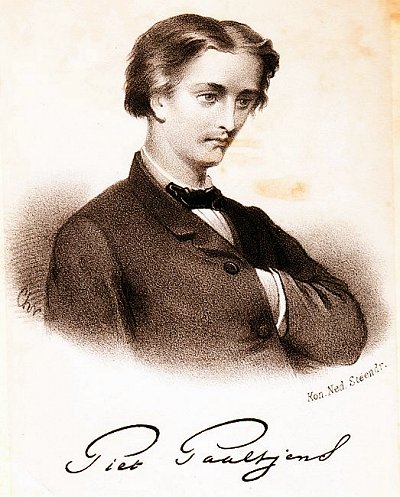
Piet Paaltjens
(François HaverSchmidt, 1835-1894)
De zelfmoordenaar
In het diepst van het woud
– ‘t Was al herfst en erg koud –
Liep een heer in zijn eentje te dwalen.
Och, zijn oog zag zoo dof!
En zijn goed zat zoo slof!
En hij tandknerste, als was hij aan ‘t malen.
“Harriot!” dus riep hij verwoed,
“‘k Heb een adder gebroed,
Neen, erger, een draak aan mijn borst hier!”
En hij sloeg op zijn jas,
En hij trapte in een plas;
‘t Spattend slik had zijn boordjes bemorst schier.
En meteen zocht zijn blik
Naar een eiketak, dik
Genoeg om zijn lichaam te torschen.
Daarna haalde hij een strop
Uit zijn zak, hing zich op,
En toen kon hij zich niet meer bemorsen.
Het werd stil in het woud
En wel tienmaal zo koud,
Want de wintertijd kwam. En intusschen
Hing maar steeds aan zijn tak,
Op zijn doode gemak,
Die mijnheer, tot verbazing der musschen.
En de winter vlood heen,
Want de lente verscheen,
Om opnieuw voor den zomer te wijken.
Toen dan zwierf – ‘t was erg warm –
Er een paar arm in arm
Door het woud. Maar wat stond dát te kijken!
Want, terwijl het, zoo zacht
Koozend, voortliep en dacht:
Hier onder deez’ eik is ‘t goed vrijen,
Kwam een laars van den man,
Die daar boven hing, van
Zijn reeds lang verteerd linkerbeen glijen.
“Al mijn leven! van waar
Komt die laars?” riep het paar,
En werktuigelijk keek het naar boven.
En daar zag het met schrik
Dien mijnheer, eens zo dik
En nu tot een geraamte afgekloven.
Op zijn grijzende kop
Stond zijn hoed nog rechtop,
Maar de rand was er af. Al zijn linnen
Was gerafeld en grauw.
Door een gat in zijn mouw
Blikten mieren en wurmen en spinnen.
Zijn horloge stond stil,
En één glas van zijn bril
Was kapot en het ander beslagen.
Op den rand van een zak
Van zijn vest zat een slak,
Een erg slijmrige slak, stil te knagen.
In een wip was de lust
Om te vrijen gebluscht
Bij het paar. Zelfs geen woord dorst het te spreken.
‘t Zag van schrik zóó spierwit
Als een laken, wen dit
Reeds een dag op het gras ligt te bleeken.
Piet Paaltjens (François HaverSchmidt) gedicht
• fleursdumal.nl magazine
More in: # Classic Poetry Archive, Archive G-H, Archive O-P, Archive O-P, Suicide
Thank you for reading Fleurs du Mal - magazine for art & literature